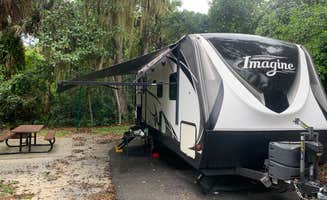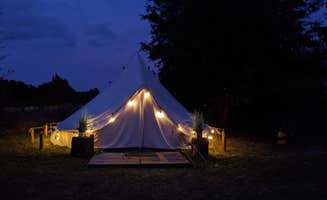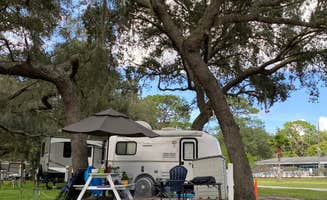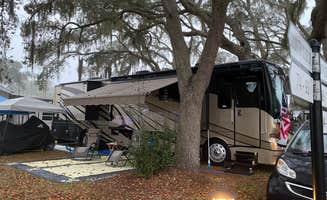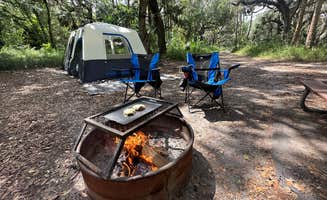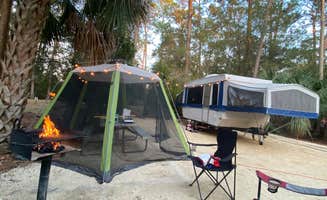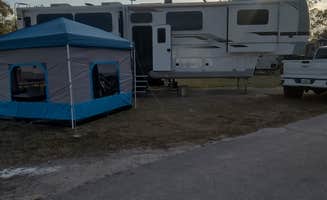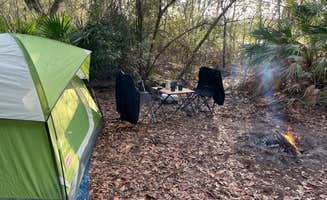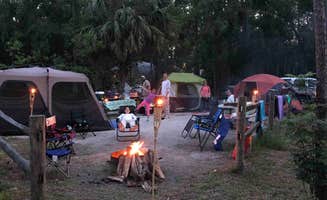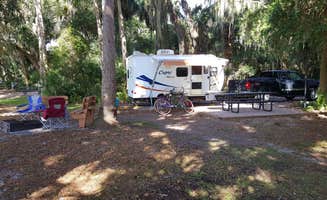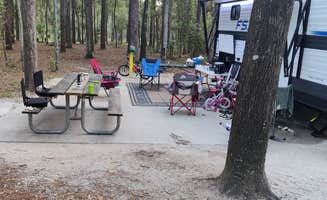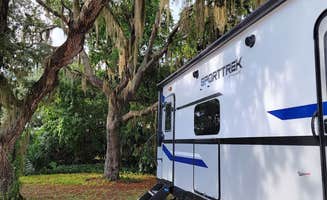The Oakland, Florida area sits at an elevation of around 120 feet above sea level with a subtropical climate featuring distinct wet and dry seasons. Most campgrounds in this region are situated on flat terrain with sandy soil, making for easy tent setup but requiring extra stakes during summer thunderstorms. Many sites feature mature oak and pine trees, offering partial shade that's welcome during the intense summer heat.
What to do
Kayaking at multiple lakes: Lake Louisa State Park Campground offers access to six named lakes with varying paddling experiences. "We were easily able to roll our Kayaks to Dixie lake from our campsite. We stayed at a site in Dixie loop sites 1-30. Hammond lake was across the road from our campground," notes one visitor to Lake Louisa State Park Campground.
Hiking through diverse terrain: The Winter Garden area features several hiking opportunities with varying difficulty levels. "This park holds many trails. We walked a few and were rewarded with peaceful treks. On one such hike, we were able to spot a bobcat in pursuit of dinner, which was a delight to see firsthand," reports a camper at Lake Louisa.
Wildlife viewing opportunities: Many campgrounds offer excellent wildlife viewing without leaving your site. At Trimble Park Campground, one camper shares: "I stayed in site 11 that was positioned so I had a magnificent view of the lake and the little gator that lived at the waters edge. I paddled my inflatable kayak around lake Carlton and the adjoining lake that has the boat ramp."
What campers like
Privacy between sites: Many campgrounds in the area provide good separation between campsites. "All of the sites seemed level, most are quite private with a fair amount of trees/foliage in between sites, have a sizable picnic table and nice fire ring with grate," notes a visitor to Lake Louisa State Park Campground.
Clean facilities consistently maintained: Wekiwa Springs State Park Campground receives praise for its upkeep. "The bathrooms were well maintained and clean. The park was a beautiful reprieve from the busyness of Orlando!" shares one camper.
Natural swimming areas: The region's springs provide natural swimming opportunities. "Wekiwa was an amazing place to camp and spend our weekend. The park offers hiking, biking, day swimming, a food grill, a canoe/kayak launch and rental, plus tons of wildlife! The campground was quiet and the restrooms fairly clean," reports a visitor.
What you should know
Reservations essential for peak periods: Competition for sites can be fierce during winter months. At Trimble Park Campground, booking requires precise timing: "Booking a reservation on a fairly archaic website with a non-sensical process that involves booking 45 days in advance, so you have to time the precise days you want to camp here and be the first person to reserve a spot at 12:01am on the day that those spots become available."
Wildlife precautions necessary: Many campgrounds have resident wildlife that requires caution. "Beware of the raccoons, they are not afraid to steal your buns right off the picnic table with you sitting there. Ha! Seriously, this little park is amazing," warns a Trimble Park visitor.
Weekend crowds at popular springs: Planning weekday visits is recommended for popular water features. "If you go on a weekend, make sure you go EARLY! Line of car starts around 9am and park will close at capacity," advises a visitor to Wekiwa Springs.
Tips for camping with families
Plan for heat protection: During summer months, shade becomes critical. At Bill Frederick Park at Turkey Lake, one visitor notes that "The sites are on a slight slope that goes down to the lake. The sites are nice with a good view of the lake," but adds that shade can be limited during peak sun hours.
Multiple recreation options: Many parks offer diverse activities beyond camping. "This park offers every recreation in the book: boating, fishing, biking, hiking, frisbee golf, wildlife watching (petting farm), jungle gyms, horse boarding, grilling spots, swimming pool. There's something here for everyone," shares a Bill Frederick Park visitor.
Accessibility considerations: Some parks have made efforts to accommodate mobility challenges. At Wekiwa Springs, a visitor shared this experience: "being handicapped, the springs were a mile from the campground, which is a problem for people having difficulty walking. My husband pushed me there in the wheelchair. once we got there, Jane, one of the park rangers informed us about the ramp for wheelchairs, and a lift into the water!"
Tips from RVers
Site sizing and maneuverability: At Disney's Fort Wilderness Resort & Campground, tight turns can create challenges: "My only problem with wilderness camping. There is not a lot of room in the loops to pull your rv into the spot. There is plenty of room between your rv and your neighbor next to you but not a lot of room across from your spot," notes one RVer with a 27-foot rig.
Transportation considerations: For large resorts, alternative transportation may be essential. "Rent a golf cart if you don't have one. Transportation was OK and the Tavern was very nice," advises a visitor to Disney's Fort Wilderness, where the extensive property size makes internal transportation helpful.
Power requirements: Electrical capacity varies between parks, creating potential issues. At Winter Garden, one camper reports: "We kept tripping the 30A breaker with AC on and a hot plate or microwave. But in the end price seemed reasonable for what it was. They did have a note saying electric lines were being improved and power may intermittently go out."


